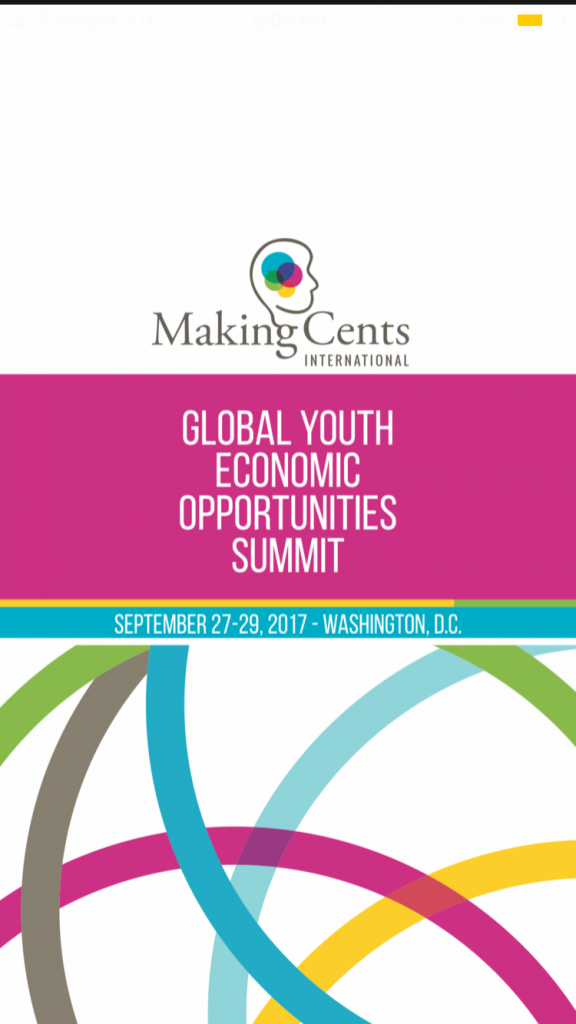This week PCDN is attending and exciting at the 11th Annual Global Youth Economic Opportunities Summit organized by Making Cents International.

PCDN is proud to be a media partner for the event. Over the next few days we will be posting several blogs about key events, and also see our FB channel for Facebook Live interviews with amazing changemakers from around the world.
On the first day of the conference, there was a very engaging session "The Gig Economy: Opportunity, Obstacle or Both for sustained livelihoods”
The panel included three great speakers:
Adam Grunewald, CEP & Co-Founder, Lynk
Shanti Nataraj, Associate Director, Personnel, Training & Health Program, Rand Arroyo Center
Ayat Solimon, Practice Manager for Urban, Social and Resilience, Middle East and North Africa Region, The World Bank
and moderated by Sherry Yousef, Making Cents International
 The session was a great exploration of the many opportunities and challenges in the emerging global economy. I left the session feeling both inspired and depressed (inspidepress) at the same time. The good news is that the gig economy is creating new opportunities for youth around the world to build their own careers, to find innovative solutions to social problems and much more. The bad news is that global youth unemployment is rising and many youth are already excluded from formal let alone informal economic opportunities. Moreover, there is no guarantee that the gig economy means that people will have strong economic opportunities, be able to thrive as entrepreneurs or live a dream life as digital nomads. There is a real risk that many people in the informal or gig economy will wind up working insane hours to survive in an exploitative system that may only get worse.
The session was a great exploration of the many opportunities and challenges in the emerging global economy. I left the session feeling both inspired and depressed (inspidepress) at the same time. The good news is that the gig economy is creating new opportunities for youth around the world to build their own careers, to find innovative solutions to social problems and much more. The bad news is that global youth unemployment is rising and many youth are already excluded from formal let alone informal economic opportunities. Moreover, there is no guarantee that the gig economy means that people will have strong economic opportunities, be able to thrive as entrepreneurs or live a dream life as digital nomads. There is a real risk that many people in the informal or gig economy will wind up working insane hours to survive in an exploitative system that may only get worse.
Some key themes that emerged from the talk:
1) The gig economy is neither good or bad - The gig economy is emerging and coming whether we like it or not. The good news is that now each person can be a steward of their own economic future. The idea that everyone can be an entrepreneur, can keep developing skills and have a flexible approach to work is growing. The bad news is that this means (if not done right) that many people will not have.a secure future, that the whole idea of benefits and stability may change for many is disappearing. Also to thrive in the gig economy often requires a certain level of digital skills or access and thus there is a risk of creating a small elite of successful gig economy workers, many who are surviving and many more who are excluded.
2) We need new public policies - Change is coming fast and many of the traditional ways of structuring society, employment and training are behind the times. There is a need to radically explore how we define the nature of work, skills, trainings, etc. In particular, in many countries benefits such as health insurance or retirement are tied ot the notion of more stable employement. There is a need to develop more robust and innovative policies to envision what are the new systems needed for the gig economy.
3) Education needs to change - “We need to move away from worksheet and book reports” to storytelling and key skills needed to thrive in the 21st century.
4) Talent can come from anywhere, but access is not equal - The good news is particularly as people can easily access platforms to be soloproneuers or freelancers, this is opening new opportunities for many in the global south. However, the bad news is that many people don’t have Internet Access, don’t have the skills to know how to access and manage such platforms.
5.Embrace the Informal Sector - Adam discussed the debate whether we should formalize the informal economy or embrace it. He talked about how he started Lynk to help people in the informal sector (which is the overwhelming majority of the workforce in Africa) find opportunities. Lynk was setup to help informal workers (who are consistently looking for work) to help people show their work history, their skills, etc. As he explained . “It is Linkedin in for a linked out community”. sSherry talked about the very interesting idea that for years many people fought to formalize the informal economy. And now there is increasing discussion about the informal economy as the emerging trend and figuring out how to work and embrace it is key. Shanti talked about the danger is creating a black and white image of formal vs. informal and that in her research it is more a continuum.
6)We need new platforms - One of the keys to the informal economy is figuring how to provide credentialing, job history and trust to help facilitate engagement between workers and also people hiring them. Adam discussed how platforms like Lynk are working to provide this trusted system and use “power of the platform” to help both workers and customers. Similar to how ratings work on Amazon, higher rated workers in Lynk tend get more jobs and also can bid for higher levels of payment.